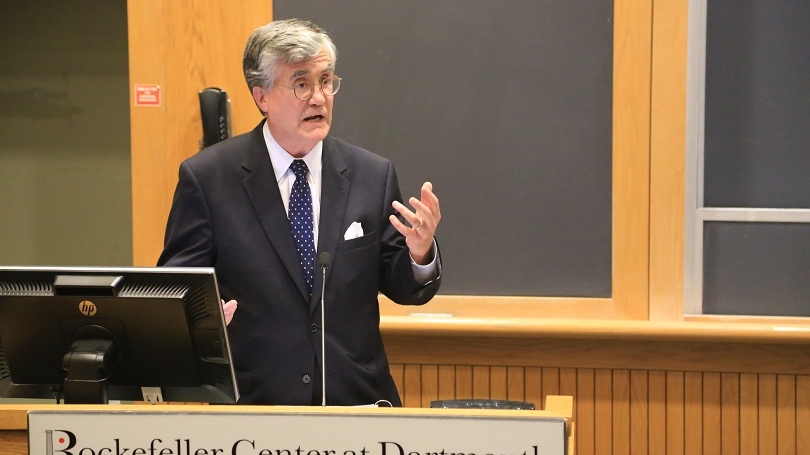
Menu
- Public Policy
- Leadership
- Funding
- News & Events
- About the Center
Back to Top Nav
Back to Top Nav
Back to Top Nav
Back to Top Nav
The Nelson A. Rockefeller Center for Public Policy and the Social Sciences has announced John T. Broderick, a former Chief Justice of the New Hampshire Supreme Court and the first Warren B. Rudman chairman at UNH Law, as the Perkins Bass Distinguished Visitor for 2014-2015.
A former Chief Justice of the New Hampshire Supreme Court and the first Warren B. Rudman chairman at UNH Law, John T. Broderick has dedicated almost his entire life to public service. He served on the New Hampshire Supreme Court for 15 years and was also appointed by President Bill Clinton to the Board of the Legal Services Corporation (LSC), on which he served for 10 years. Broderick is the recipient of several honorary degrees, is a Fellow of the American College of Trial Lawyers, and recently received a Lifetime Achievement Award from the New Hampshire Business & Industry Association. He was President of the New Hampshire Bar Association from 1990 to 1991 and also served as a litigation attorney.
During his Visitorship, Former Chief Justice Broderick visited campus several times, visiting classes, engaging with students and faculty, and culminating his Perkins Bass Visitorship with a public talk on October 15, 2014. Justice Broderick's public talk, “Public Service Is Not for the Faint of Heart: Hard Lessons,” discussed his passion for public service, the influence of family and public figures, and, for the first time in public, the hard lessons he learned during a very public impeachment and then acquittal process when he sat on the New Hampshire Supreme Court. Additional remarks about his personal experiences in public service can be read here.
During his time on campus, Justice Broderick made time for an interview with Rocky Student Program Assistant Courtney Wong ’15. An edited transcript of their conversation follows here:
Courtney Wong '15 (CW): In addition to your duties on the bench, you have also found plenty of time to devote to academia and teaching, including here at the Tuck Business School at Dartmouth College. How do those two compare?
John T. Broderick (JB): Both are similar, but my judicial duties were a process that moved on a conveyor belt at a faster pace, and so the “product” of my investigation had to come to market much more quickly. Also, it was often in a topic in which I had no interest. Whereas in academia you tend to pick an area that interests you, it doesn’t matter on the court. You write opinions on all cases and you need to be as informed on each. It’s harder in a way because it’s not voluntary.
CW: What made cases more interesting or enjoyable to work on than others?
JB: I would say the lawyers and the facts. It wouldn’t have to necessarily be a criminal law case or a domestic relationship case, but if there were interesting fact patterns and really good lawyers, it often led to interesting constitutional questions. Sometimes you found yourself in a situation where there was no decided law, so you needed to determine what the best public policy was. In this sense, you almost had legislative authority, which was rewarding but also a bit humbling because most people don’t think of judges having to do that.
CW: Where did your interest in law come from?
JB: My interest in law stemmed from wanting to be a trial lawyer. I thought I could meet interesting people, be in an environment where one was informed, and be able to convince and persuade people with a sense of integrity. The constitution is just a document. It’s lawyers who constantly expand and challenge the document, and I thought that was a very rare privilege. And to be commissioned as a judge to interpret the constitution of New Hampshire was an amazing responsibility because almost no people get that opportunity.
CW: What are the biggest barriers to improving legal services to poor and low-income individuals?
JB: Number one, it's a reluctance of the court system itself to change. Number two, there will never be enough lawyers for the financially disadvantaged. Unless we redesign the court system, we will never be able to do it. If I were king for a day, I would keep the current system but simplify the forms and the processes, and provide people with virtual assistance and self-help centers away from the courthouse. I would also introduce mediation and arbitration in the court system (most people don’t want to actually go to trial) and I would also create a system for paralegal practitioners who could actually practice and help in a way that lawyers would but for much less money. We’ve lost proportionality in the justice system, so it’s too expensive for many people.
Named after longtime New Hampshire U.S. Congressman Perkins Bass, member of the Dartmouth College Class of 1934, this appointment is meant to celebrate a New Hampshire citizen who has made outstanding contributions in government, and provide Visitors the opportunity to share their knowledge with the Dartmouth community. Along with sponsoring visitors, the Perkins Bass ’34 Fund also provides internship funding for Dartmouth students who wish to work for the state of New Hampshire.